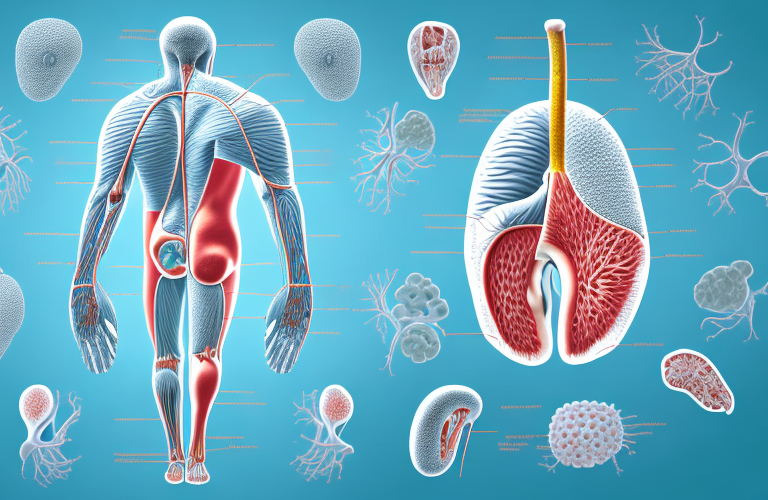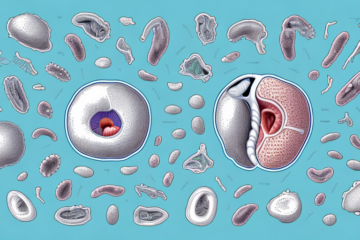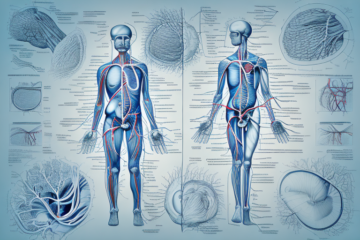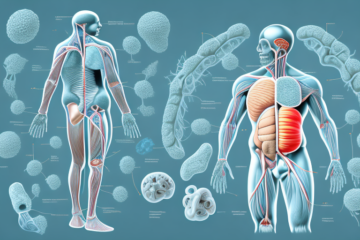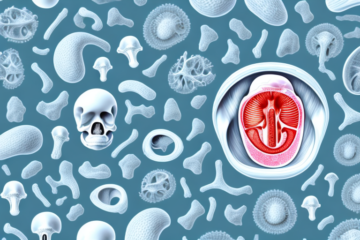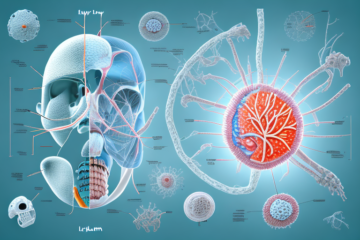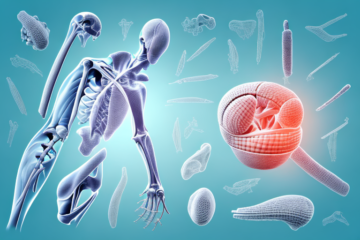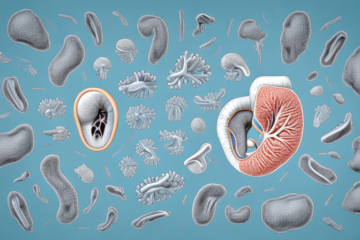The prostate gland is one of the most important components of the male reproductive system. Located just below the bladder, it is responsible for producing seminal fluid, the liquid that combines with sperm to form semen. In this article, we’ll take a closer look at the function and anatomy of the prostate gland, as well as the common problems that can arise and how to maintain a healthy prostate.
Understanding the Male Reproductive System
Before we dive into the details of the prostate gland, it’s important to have a basic understanding of the male reproductive system. The male reproductive system includes the penis, testes, and a series of tubes and glands that work together to produce and transport semen. Semen is essential for reproduction as it carries sperm from the testes to the female reproductive system during sexual intercourse.
The penis is the external male reproductive organ that is responsible for delivering semen into the female reproductive system during sexual intercourse. It is made up of three parts: the root, the shaft, and the glans. The root attaches the penis to the pelvic bone, while the shaft is the long, cylindrical part of the penis. The glans is the rounded tip of the penis that is highly sensitive to touch.
The testes are the male reproductive glands that produce sperm and testosterone. They are located in the scrotum, which is a sac of skin that hangs outside the body. The scrotum helps to regulate the temperature of the testes, which is important for sperm production. The testes also produce testosterone, which is the primary male sex hormone responsible for the development of male secondary sexual characteristics.
What is the Prostate Gland?
The prostate gland is a small, walnut-sized gland that is located just below the bladder and in front of the rectum. It surrounds the urethra, the tube that carries urine from the bladder to the penis, and is responsible for producing seminal fluid. This fluid plays a crucial role in the transportation and protection of sperm during ejaculation.
As men age, the prostate gland can become enlarged, leading to a condition called benign prostatic hyperplasia (BPH). This can cause difficulty with urination and other urinary symptoms. Additionally, the prostate gland can also be affected by cancer, which is one of the most common types of cancer in men. Regular prostate exams and screenings are important for early detection and treatment of any potential issues with the prostate gland.
The Role of the Prostate in Reproduction
As mentioned earlier, the prostate gland produces seminal fluid, which is essential for male reproduction. The fluid not only helps to transport and protect the sperm during ejaculation, but also provides nutrients for the sperm to ensure their survival. The prostate also contains muscles that help to propel the semen out of the penis during ejaculation.
In addition to its role in reproduction, the prostate gland can also be a site of health concerns. Prostate cancer is one of the most common types of cancer in men, and regular prostate exams are recommended for early detection. Other conditions that can affect the prostate include prostatitis, which is inflammation of the prostate, and benign prostatic hyperplasia, which is an enlargement of the prostate that can cause urinary problems.
Common Prostate Problems and Their Symptoms
Unfortunately, the prostate gland is prone to a variety of problems as men age. The most common are benign prostatic hyperplasia (BPH), prostatitis, and prostate cancer. BPH is marked by an enlarged prostate, which can cause difficulty urinating, urinary tract infections, and other problems. Prostatitis is an inflammation of the prostate gland that can cause pain and discomfort in the groin area, as well as difficulty urinating. Prostate cancer, on the other hand, is a serious condition that can spread to other parts of the body if not treated early. Symptoms of prostate cancer can include difficulty urinating, blood in the urine or semen, and pain in the lower back and hips.
It is important for men to be aware of the risk factors for prostate problems and to get regular check-ups with their healthcare provider. Risk factors for prostate problems include age, family history, and certain lifestyle factors such as a diet high in red meat and low in fruits and vegetables. Early detection and treatment of prostate problems can greatly improve outcomes and quality of life for men.
Risk Factors for Prostate Cancer
While the exact cause of prostate cancer is unknown, there are several risk factors that have been identified. Age is the biggest risk factor, with the majority of cases occurring in men over the age of 65. Family history, race, and a diet high in red meat have also been linked to an increased risk of prostate cancer.
Other risk factors for prostate cancer include obesity, smoking, and exposure to certain chemicals. Studies have shown that men who are obese have a higher risk of developing aggressive prostate cancer. Smoking has also been linked to an increased risk of prostate cancer, as well as a higher risk of dying from the disease. Exposure to certain chemicals, such as cadmium and pesticides, may also increase the risk of prostate cancer.
Early Detection and Screening for Prostate Cancer
Early detection is key to successfully treating prostate cancer. Most cases are detected through a blood test that measures the levels of prostate-specific antigen (PSA) in the blood. A digital rectal exam (DRE) may also be performed to check for lumps or abnormal areas in the prostate. Men over the age of 50, or younger if they have a family history of prostate cancer, should talk to their doctor about getting regular prostate cancer screenings.
It is important to note that PSA levels can also be elevated due to other conditions such as an enlarged prostate or an infection. Therefore, if a man’s PSA levels are found to be high, further testing may be needed to determine the cause. Additionally, some men may choose to undergo regular prostate cancer screenings even if they do not have any symptoms or risk factors, as early detection can greatly increase the chances of successful treatment.
Treatment Options for Prostate Cancer
The treatment for prostate cancer depends on the stage of the cancer and the individual’s health and preferences. Treatment options include surgery, radiation therapy, and hormone therapy. Active surveillance may also be an option for men with early-stage prostate cancer, in which the cancer is monitored closely but not treated until it begins to grow or spread.
Surgery is a common treatment option for prostate cancer, especially for men with early-stage cancer. The most common type of surgery for prostate cancer is a radical prostatectomy, which involves removing the entire prostate gland and some surrounding tissue. This surgery can be done through traditional open surgery or minimally invasive laparoscopic or robotic-assisted surgery.
Radiation therapy uses high-energy radiation to kill cancer cells. It can be delivered externally, using a machine outside the body, or internally, using radioactive seeds placed directly into the prostate gland. Radiation therapy may be used alone or in combination with other treatments, such as hormone therapy.
Lifestyle Changes to Promote a Healthy Prostate
While there is no surefire way to prevent prostate problems, there are lifestyle changes that can help to support a healthy prostate. These include eating a diet low in red meat and high in fruits and vegetables, maintaining a healthy weight, and exercising regularly. It’s also important to drink plenty of water and avoid smoking and excessive alcohol consumption.
In addition to these lifestyle changes, there are also certain supplements and vitamins that may be beneficial for prostate health. For example, saw palmetto extract has been shown to improve urinary symptoms associated with an enlarged prostate, while vitamin D may help to reduce the risk of prostate cancer.
It’s important to note that while these lifestyle changes and supplements may be helpful, they should not replace regular prostate screenings and medical care. If you experience any symptoms or concerns related to your prostate health, it’s important to speak with your healthcare provider for proper evaluation and treatment.
Natural Remedies and Supplements for Prostate Health
Some men may find relief from prostate problems by using natural remedies and supplements. Saw palmetto, pygeum, and stinging nettle are some of the most commonly used supplements for BPH and prostatitis. It’s important to talk to a doctor before taking any supplements, as they may interact with other medications or worsen certain conditions.
In addition to supplements, there are also some natural remedies that may help improve prostate health. Regular exercise, such as brisk walking or cycling, can help reduce the risk of developing prostate problems. Eating a diet rich in fruits, vegetables, and whole grains may also be beneficial. Some studies have shown that certain foods, such as tomatoes and green tea, may have a protective effect on the prostate. However, more research is needed to confirm these findings.
Surgical Procedures for Enlarged or Diseased Prostates
In some cases, surgery may be necessary to treat an enlarged or diseased prostate. Minimally invasive procedures, such as transurethral resection of the prostate (TURP) and laser therapy, are often used to remove excess tissue and improve urinary function. In more severe cases, a radical prostatectomy (surgical removal of the prostate gland) may be necessary to treat prostate cancer.
It is important to note that surgery is not always the first line of treatment for an enlarged or diseased prostate. Other options, such as medication or lifestyle changes, may be recommended before considering surgery. Additionally, surgery may not be suitable for all patients, particularly those with certain medical conditions or who are at high risk for complications.
After undergoing prostate surgery, patients may experience side effects such as urinary incontinence or erectile dysfunction. However, these side effects are often temporary and can be managed with medication or other treatments. It is important for patients to discuss the potential risks and benefits of surgery with their healthcare provider before making a decision.
Maintaining Sexual Health with a Healthy Prostate
The health of the prostate gland is closely linked to sexual health in men. For this reason, it’s important to maintain a healthy prostate through regular check-ups, lifestyle changes, and prompt treatment of any prostate problems that arise. Men who experience erectile dysfunction or other sexual problems should talk to their doctor about possible treatments and ways to support overall prostate health.
Some lifestyle changes that can help maintain a healthy prostate include regular exercise, a balanced diet, and limiting alcohol and caffeine intake. Additionally, certain supplements and foods, such as saw palmetto and tomatoes, have been shown to support prostate health. It’s important to discuss any changes to your diet or supplement regimen with your doctor before making them.
Coping with Diagnosis and Treatment of Prostate Cancer
A diagnosis of prostate cancer can be overwhelming and scary. It’s important to have a support system in place and to take steps to manage stress and anxiety during treatment. There are many resources available for men with prostate cancer, including support groups, counseling services, and alternative therapies.
It’s also important to maintain a healthy lifestyle during treatment. Eating a balanced diet and staying physically active can help manage side effects and improve overall well-being. Additionally, it’s important to communicate openly with your healthcare team about any concerns or questions you may have. They can provide valuable information and support throughout your treatment journey.
Living with an Enlarged or Diseased Prostate: Tips and Advice
For men living with an enlarged or diseased prostate, there are many tips and strategies that can help to manage symptoms and improve quality of life. These include practicing good bladder habits, such as emptying the bladder completely and urinating on a regular schedule, avoiding certain foods and beverages that can irritate the bladder, and taking medications as prescribed. It’s also important to talk to a doctor about any concerns or questions related to prostate health.
In conclusion, the prostate gland plays a vital role in the male reproductive system and can be prone to a variety of problems as men age. By maintaining a healthy lifestyle, getting regular check-ups, and seeking prompt treatment for any prostate problems that arise, men can help to support optimal prostate health and overall well-being.
It’s worth noting that some natural remedies and lifestyle changes may also help to alleviate symptoms of an enlarged or diseased prostate. These can include consuming more fruits and vegetables, engaging in regular exercise, and practicing stress-reducing techniques such as meditation or yoga. However, it’s important to consult with a healthcare professional before making any significant changes to your diet or exercise routine, as some remedies may interact with medications or exacerbate existing health conditions.

